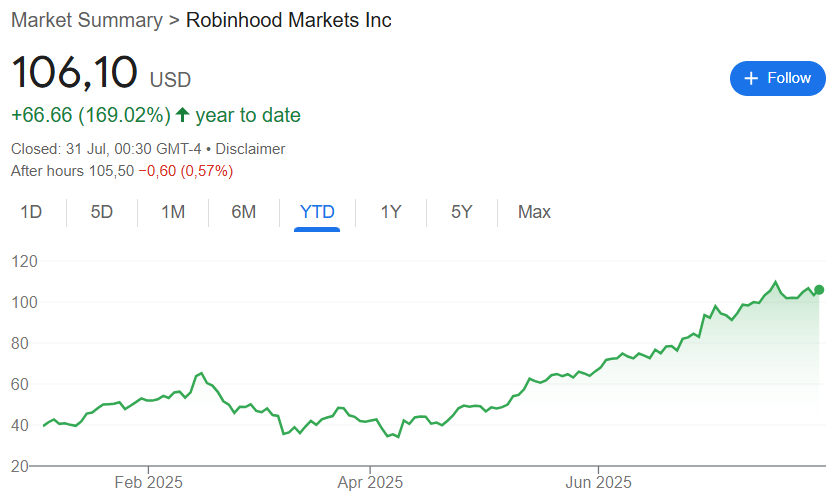TLDR
- Robinhood’s crypto revenue doubled to $160 million in Q2, a 98% year-over-year increase
- The company beat Wall Street expectations with $989 million total revenue and $0.42 earnings per share
- CEO Vlad Tenev is pushing hard on tokenization strategy, calling it “the biggest innovation our industry has seen in the past decade”
- Robinhood acquired Bitstamp for $200 million and WonderFi for $179 million to expand globally
- The company launched tokenized stocks in Europe but faces legal concerns from regulators
Robinhood reported strong second-quarter earnings that beat Wall Street expectations, driven by a surge in crypto trading revenue and strategic acquisitions. The trading platform’s crypto revenue jumped 98% year-over-year to $160 million, up from $81 million in the same period last year.
The company posted adjusted earnings per share of $0.42, beating analyst estimates of $0.31 and doubling from the previous year. Total net revenue climbed 45% to $989 million, surpassing the consensus estimate of $928.8 million according to FactSet data.
Crypto trading volume reached $28.3 billion in the second quarter, a 32% increase from the previous period. This growth came as the overall crypto market cap expanded 21.7% to $3.36 trillion during the quarter.
CEO Vlad Tenev emphasized the company’s focus on tokenization during the earnings call. He described tokenization as “the biggest innovation our industry has seen in the past decade” and outlined plans to lead the real-world asset tokenization market both domestically and internationally.
The company launched Robinhood Chain, a tokenization-focused layer 2 blockchain for stock trading in Europe last month. This move represents part of Robinhood’s broader strategy to tokenize alternative assets that were previously hard for retail investors to access.
Strategic Acquisitions Drive Expansion
Robinhood’s strong quarter reflects more than just favorable market conditions. In June, the company acquired crypto exchange Bitstamp for $200 million, followed by a $179 million purchase of WonderFi, a Canadian crypto platform.
These acquisitions help Robinhood expand its regulated footprint across North America and play a key role in the company’s tokenization strategy. The Bitstamp deal, completed almost two months ago, is expected to be particularly important for the company’s crypto ambitions.
Tenev highlighted the company’s competitive advantages in tokenization, pointing to Robinhood’s 25 million US users and the $1 trillion in assets under custody. He argued this user base and asset scale would be “very, very difficult for others to replicate.”
Regulatory Challenges and Market Position
The company has already begun issuing private equity tokens in Europe that resemble shares of companies like OpenAI and SpaceX. However, these tokenization offerings have raised legal concerns in some jurisdictions.
Lithuania has launched a legal inquiry into Robinhood’s tokenization offerings. OpenAI has also warned that Robinhood’s OpenAI token doesn’t represent actual equity in the company.
Despite these challenges, Tenev reported strong developer interest since unveiling the tokenization strategy in Cannes, France. He said the company has received numerous calls from developers wanting to tokenize their company assets or partner on real-world asset tokenization.

Robinhood’s stock has rallied 177% this year, making it the biggest gainer among US tech stocks. The company’s market value has reached $91 billion, approaching Coinbase’s market capitalization.
Ethereum currently dominates the crypto tokenization market with nearly $7 billion worth of real-world assets secured, according to RWA.xyz data. Ethereum layer 2 ZKsync Era holds second place with $2.4 billion, representing about 19% market share.







